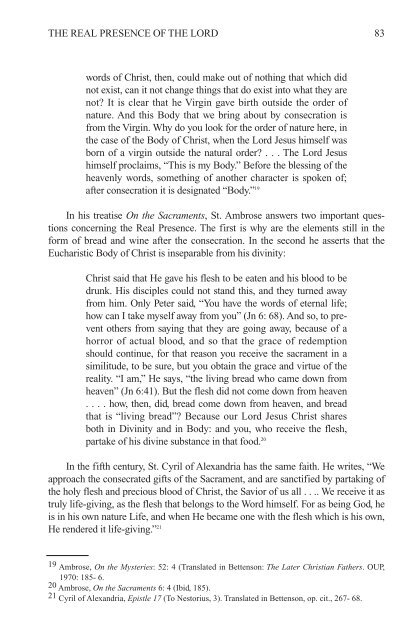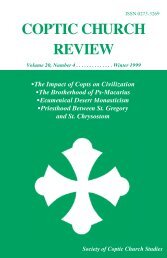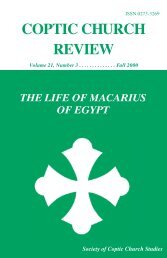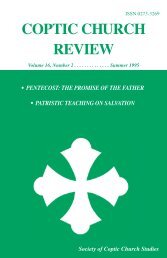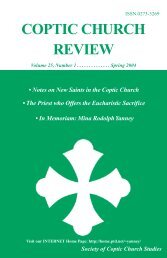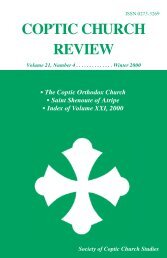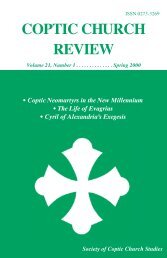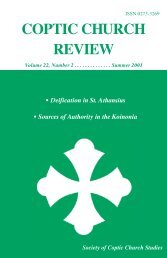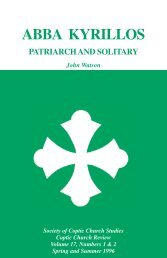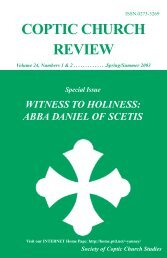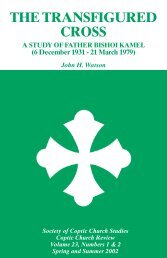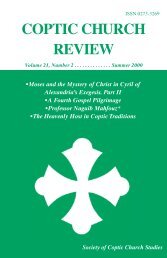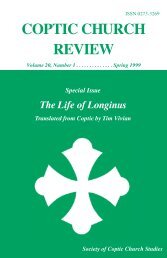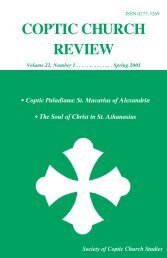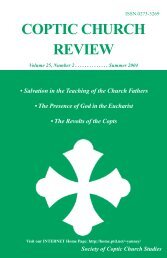2004 Fall.Vol25.#3.pdf - Coptic Church Review
2004 Fall.Vol25.#3.pdf - Coptic Church Review
2004 Fall.Vol25.#3.pdf - Coptic Church Review
Create successful ePaper yourself
Turn your PDF publications into a flip-book with our unique Google optimized e-Paper software.
THE REAL PRESENCE OF THE LORD 83<br />
words of Christ, then, could make out of nothing that which did<br />
not exist, can it not change things that do exist into what they are<br />
not? It is clear that he Virgin gave birth outside the order of<br />
nature. And this Body that we bring about by consecration is<br />
from the Virgin. Why do you look for the order of nature here, in<br />
the case of the Body of Christ, when the Lord Jesus himself was<br />
born of a virgin outside the natural order? . . . The Lord Jesus<br />
himself proclaims, “This is my Body.” Before the blessing of the<br />
heavenly words, something of another character is spoken of;<br />
after consecration it is designated “Body.” 19<br />
In his treatise On the Sacraments, St. Ambrose answers two important questions<br />
concerning the Real Presence. The first is why are the elements still in the<br />
form of bread and wine after the consecration. In the second he asserts that the<br />
Eucharistic Body of Christ is inseparable from his divinity:<br />
Christ said that He gave his flesh to be eaten and his blood to be<br />
drunk. His disciples could not stand this, and they turned away<br />
from him. Only Peter said, “You have the words of eternal life;<br />
how can I take myself away from you” (Jn 6: 68). And so, to prevent<br />
others from saying that they are going away, because of a<br />
horror of actual blood, and so that the grace of redemption<br />
should continue, for that reason you receive the sacrament in a<br />
similitude, to be sure, but you obtain the grace and virtue of the<br />
reality. “I am,” He says, “the living bread who came down from<br />
heaven” (Jn 6:41). But the flesh did not come down from heaven<br />
. . . . how, then, did, bread come down from heaven, and bread<br />
that is “living bread”? Because our Lord Jesus Christ shares<br />
both in Divinity and in Body: and you, who receive the flesh,<br />
partake of his divine substance in that food. 20<br />
In the fifth century, St. Cyril of Alexandria has the same faith. He writes, “We<br />
approach the consecrated gifts of the Sacrament, and are sanctified by partaking of<br />
the holy flesh and precious blood of Christ, the Savior of us all . . .. We receive it as<br />
truly life-giving, as the flesh that belongs to the Word himself. For as being God, he<br />
is in his own nature Life, and when He became one with the flesh which is his own,<br />
He rendered it life-giving.” 21<br />
19 Ambrose, On the Mysteries: 52: 4 (Translated in Bettenson: The Later Christian Fathers. OUP,<br />
1970: 185- 6.<br />
20 Ambrose, On the Sacraments 6: 4 (Ibid, 185).<br />
21 Cyril of Alexandria, Epistle 17 (To Nestorius, 3). Translated in Bettenson, op. cit., 267- 68.


